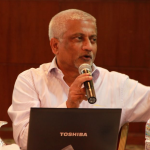Cyber security, surveillance and anonymity: The debate at #SAFoE
by Richa Kaul Padte
This blog post is fifth in a series of ten blog posts to report on the 'Third South Asian Meeting on the Internet and Freedom of Expression' recently concluded in Dhaka, Bangladesh.
The issue of anonymity – whether or not individuals should be made to disclose real life data when registering for or using ICTs – was a hot topic throughout the meeting.
The discussion was sparked by one of the meeting’s key speakers, Rohan Samarajiva, Chair and CEO of LIRNEasia in Sri Lanka, who advocates for registration for the use of mobile phone simcards in order to create a stronger system of security and crime prevention. Furthermore, Samarajiva cites the example of car registration, a largely uncontested issue, as an important and valuable precedent for developing an approach to newer technologies.
A significant opponent to this perspective was keynote speaker KS Park, who believes that this approach creates a system where everyone is by default treated as a criminal. Below are extracts from the debate that followed Rohan’s talk:
Park: It’s always easier for the government [to prevent crime] when all the means (and by extension, people) of crimes have names on them. It is easier to investigate any crime if people are restricted in owning means of crime. Yes, cars are always registered, but that’s because cars have a special risk – they can be used to [directly] commit a crime, and for fleeing the scene of a crime. Mobile phones can be used [to facilitate] crimes, but words don’t carry the risks of physical harm.
Samarajiva: The basic issue is that if you are in the fixed telephony world, you cannot have a fixed telephone anonymously. You can make anonymous calls. And remember, there are no anonymous post-paid phone connections. It was only in something that was initially a trial (i.e. prepaid connections) that we have the possibility of people not having an identity associated with the phone. [The possibility of anonymity is new, not surveillance]
Park: When you walk down a street, people with masks may come and beat you up – you can’t do anything about that. Does that mean that the govt requires everyone on the street to walk with a nametag? People are born anonymously – it’s when the state tries to link people to crimes that anonymity becomes a problem…[I quote the] Korean Congressional Court: ‘Making people posting online identify themselves just because they may commit crimes online – not just those likely to commit crimes, but all people going online – is treating everyone like potential criminals’.
In a session on the following day, Park delivered a talk specifically around the issue of anonymity, which alongside framing country perspectives on the issue, revisited the previous day’s discussion. He says, ‘We are putting a prior restraint on people who want to live their lives in a legal and innocent way. If you want to treat everyone as potential criminals, there has to be some justification… When it comes to the Internet, it has traditionally worked fine with a warrant procedure, instead of asking everyone to register in advance. [Real] name registration is something that is foreign to traditional law enforcement.’ Admittedly, these traditional systems of crime investigation may take longer, and may be harder – but they act in the interests of the rights of individual citizens rather than the ease of the state. Park also usefully draws attention to the fact that if the government were to carry out intensive surveillance on the Internet, it would choose who to monitor, and would invariably often focus on those individuals and groups it considered to be the greatest political, social or religious threat – as perspectives from various South Asian countries have shown. However, as Park points out: ‘people doing criminal things on the net will not use their own identity data…[In the same way] do you really think that terrorists will use a phone registered under their [real] names?’
It is possible also, however, to see the merits of real name identification in the context of rising hate speech online, where perhaps without the ability to develop a ‘fake’ identity, people may be more reluctant to incite discrimination and violence. Contributing from the floor and framing the debate through the lens of freedom of expression, Executive Director of Mumbai-based media women’s organisation Point of View Bishakha Datta highlights the real challenge for governments and democracies: putting citizens rather than the state at the centre. She says, ‘One of the reasons that the laws around freedom of expression are so messy is that they are coming from a top-down process, [and are constantly asking] what is in the interests of the government? If we reverse this and put rights of citizens at the centre, I think we would approach [the issue of anonymity and security] differently.’
Using this rights-based approach, as also advocated by Park during his keynote speech, can usefully contribute to the role that anonymity plays in either furthering or restricting the freedom of speech.
